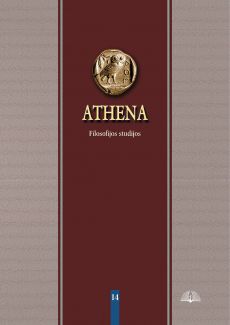KADA IŠ TIESŲ PRASIDĖS ANTROPOCENAS? APIE DAR VIENĄ GALIMĄ ANTROPOCENO TERMINO REIKŠMĘ
WHEN WILL THE ANTHROPOCENE REALLY BEGIN? ON A YET ANOTHER POSSIBLE NEW MEANING OF THE TERM “ANTHROPOCENE”
Author(s): Naglis KardelisSubject(s): Ethics / Practical Philosophy
Published by: Lietuvos kultūros tyrimų
Keywords: Anthropocene; Holocene; geology; ethics;
Summary/Abstract: The author of the article examines the concept of the Anthropocene in terms of criteria that might define the true meaning of this term and, in case the Anthropocene has already begun or is anticipated in the near future, would clearly indicate the onset of this new geological epoch. The author claims that the Anthropocene should be understood in a novel way. It is argued that the true meaning of this concept should not be tied to specific technological innovations in human history – the innovations that have greatly empowered humanity and established it as a significant planetary force on a geological scale – nor to the simple fact that the human race has evolved and already exerts a huge “new” and “significant” influence on the Earth’s climate, biology, and geology. In the author’s opinion, the meaning of this concept should be defined in ethical terms. While retaining the present linguistic form of this term, we should reinterpret its meaning in a novel way. As we know, the word Anthropocene is a combination of two Greek roots as constituent morphological parts of it: the first root relates this term to the concept of man, or human being (from the Greek noun anthrōpos, meaning “man, human being”), and the second one relates it to the concept of newness, novelty (from the Greek adjective kainos, meaning “new”). In the author’s opinion, instead of defining the Anthropocene as a distinct geological epoch, simply by referring to the fact that the current state of planetary life is “new” because of geologically significant human activity, we should tie the true meaning of this term and the criteria of the future onset of the Anthropocene as a new geological epoch to the possibility of such (currently only hypothetical) human being that would emerge as a completely new being, “new man” (kainos anthrōpos) in an ethical sense – a new man that would be radically different from the present man who is, unfortunately, the “old”, ethically unreformed and untransformed, human being. It is very important to stress that when we speak about this “new man”, “new human being”, we should have in mind the whole of humanity, mankind as a whole, not only individual human beings: currently, from the ethical standpoint, humanity as a whole performs quite poorly on a global scale, though there are many “new” and “good” individual human beings around us. Such “new man”, “new human being”, understood as the entire humankind personified, would not only be able, if sees fit and so wishes, to exert a tremendous influence on the planet, but also to curb one’s selfish ambitions for the sake of the whole planet and thus act ethically for the benefit of the whole Earth. We should only regret that the Anthropocene conceived in this way has not yet arrived – but we might hope that such an epoch will someday come. And we should make our best efforts to make it come sooner.
Journal: Athena: filosofijos studijos
- Issue Year: 2019
- Issue No: 14
- Page Range: 10-24
- Page Count: 15
- Language: Lithuanian

